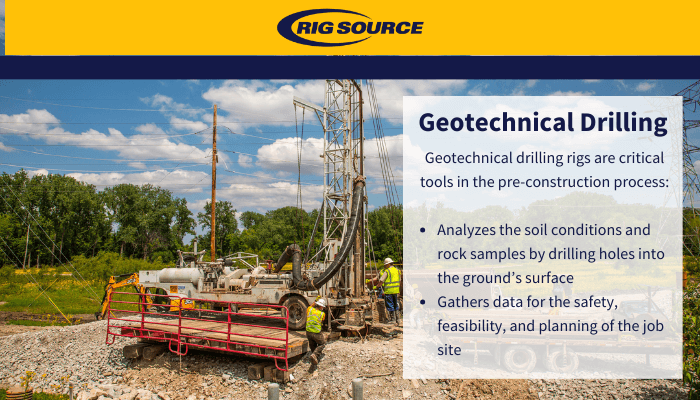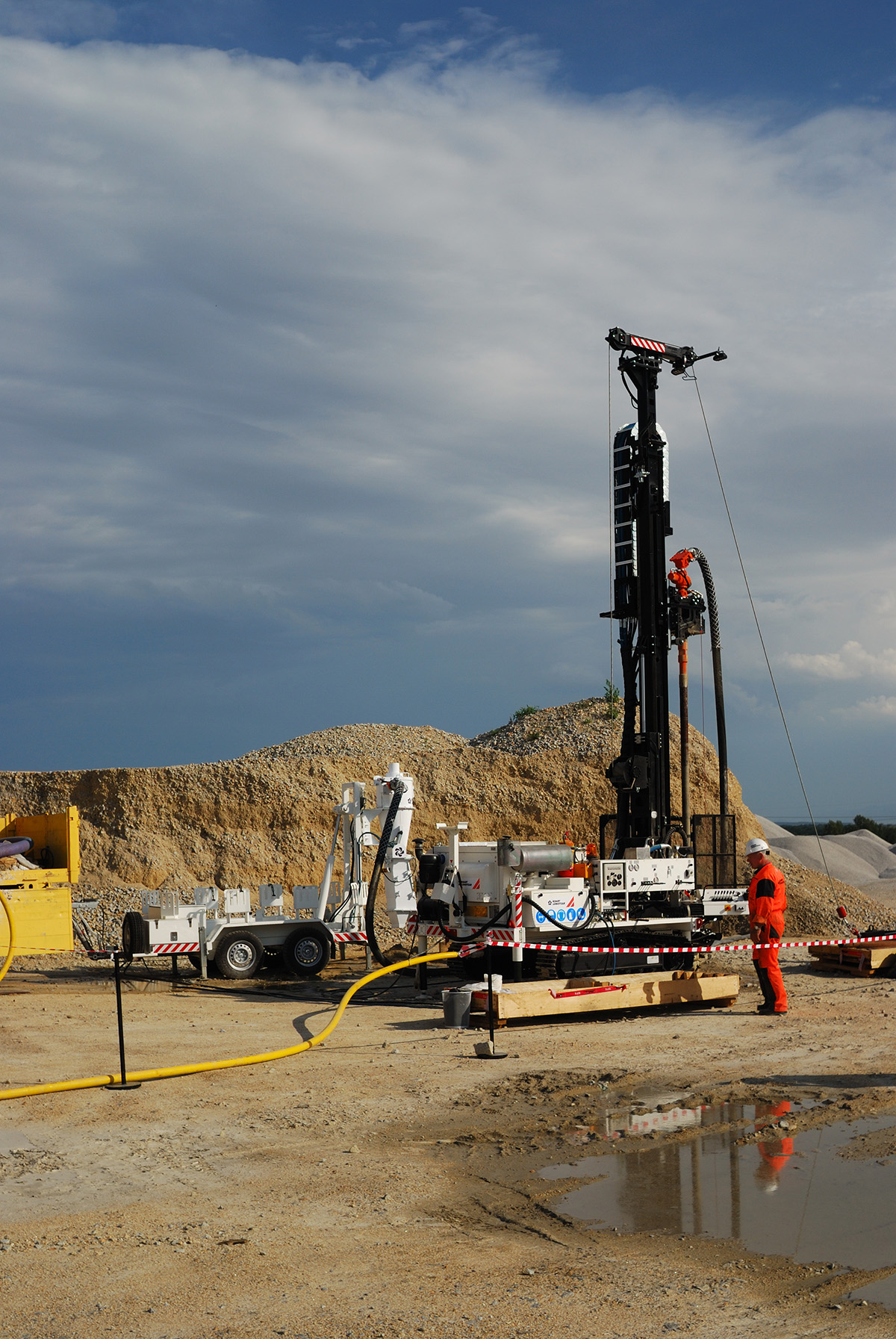Everything You Need to Learn About Geotechnical Engineering for Your Following Job
Everything You Need to Learn About Geotechnical Engineering for Your Following Job
Blog Article
The Relevance of Geotechnical Design in Resolving Ecological Difficulties and Enhancing Building Security
Geotechnical engineering offers as a foundation in the junction of ecological stewardship and construction safety and security, supplying crucial understandings into the actions of soil and rock under various conditions. By executing strategic website investigations and customized mitigation measures, geotechnical designers play a vital function in safeguarding both human lives and environmental integrity.

Function of Geotechnical Design
Geotechnical design plays an essential duty in the layout and building and construction of framework by attending to the habits of soil and rock materials under numerous problems. This field of engineering is essential for understanding the communication in between structures and the ground, which includes determining the load-bearing ability of dirt, evaluating stability, and predicting possible settlement or failure.
Geotechnical designers are in charge of carrying out site examinations, which include tasting and screening soil and rock to collect information on their physical and chemical residential or commercial properties. This information is essential for creating foundations, maintaining walls, and various other earth-retaining frameworks that ensure safety and security and durability. Furthermore, geotechnical design notifies the option of proper construction approaches and materials, therefore lessening risks connected with soil habits.
In addition, the assimilation of geotechnical engineering concepts into city planning and ecological administration is important for addressing difficulties such as ground contamination and groundwater management. By comprehending geotechnical factors, engineers can create lasting services that enhance the durability of framework against natural threats, while additionally advertising ecological stewardship. Inevitably, the function of geotechnical design is essential for accomplishing secure, durable, and environmentally mindful building techniques.
Dirt Disintegration Reduction
Dirt disintegration poses a significant danger to both ecological security and framework honesty, influencing approximately 24 billion lots of productive dirt shed every year worldwide. This sensation is aggravated by variables such as logging, urbanization, and inadequate farming techniques. Geotechnical design plays a crucial duty in creating reliable dirt disintegration mitigation methods that secure both the atmosphere and building jobs.
One method involves the implementation of erosion control methods such as vegetation growing, which maintains dirt via origin systems. Furthermore, the building of keeping walls and terraces can successfully decrease surface drainage and shield prone areas from erosion. Proper water drainage style is also essential; it minimizes water buildup and guides excess runoff far from important structures.
Moreover, geotechnical designers utilize dirt stablizing techniques, such as the application of geotextiles and eco-friendly mats, to enhance dirt cohesion and protect against deterioration - all about geotechnical engineering. Regular surveillance and evaluation of erosion-prone websites enable timely treatments, guaranteeing lasting sustainability. By integrating these approaches, geotechnical engineering not just reduces the influences of dirt erosion however additionally adds to the strength of framework versus ecological obstacles, eventually fostering a much safer and much more lasting built setting
Groundwater Protection Approaches
Groundwater acts as an important resource for alcohol consumption water, farming, and industrial processes, making its defense important for ecological sustainability and public health. Efficient groundwater security approaches are vital in alleviating contamination risks and guaranteeing the durability of this source.

Routine monitoring of groundwater top quality is likewise essential, making it possible for early discovery of contamination sources and promoting timely removal efforts. Using sophisticated modern technologies, such as geophysical surveys and remote picking up, aids in recognizing potential hazards to groundwater reserves.
In addition, public education and stakeholder interaction are crucial, promoting area support for groundwater defense efforts. all about geotechnical engineering. By combining governing steps, technical improvements, and area involvement, we can develop an extensive framework hop over to here that safeguards groundwater sources while promoting sustainable advancement and construction practices
Landslide Danger Monitoring
Landslides pose considerable hazards to both human security and framework, making reliable risk administration approaches essential. Geotechnical engineering plays a crucial duty in determining, evaluating, and mitigating landslide dangers. A thorough understanding of incline security, dirt technicians, and hydrology is vital for developing reliable danger administration strategies.
The primary step in landslide threat monitoring entails detailed site investigations, that include geological mapping and soil testing. These investigations help engineers evaluate the potential for landslides by identifying crucial factors such as slope angles, dirt make-up, and water web content. Using sophisticated innovations such as remote sensing and geophysical surveys can boost the precision of these evaluations.
When risks are identified, ideal reduction steps can be executed. These may consist of design services such as retaining wall surfaces, water drainage systems, and slope stabilization strategies. Keeping an eye on systems should be developed to find signs of ground activity and modifications in water degrees, enabling for proactive treatments.

Enhancing Building Security
Building websites typically provide a myriad of dangers that can endanger worker security and project integrity. Geotechnical engineering plays a crucial role in enhancing building and construction security by giving her response necessary insights right into subsurface problems. Via detailed dirt and rock analysis, geotechnical engineers can recognize possible dangers, such as soil instability, groundwater issues, and seismic susceptabilities, which might compromise the safety of building and construction tasks.
Applying geotechnical services, such as correct foundation layout and the use of maintaining frameworks, reduces these threats considerably. These remedies not only guarantee the security of the structures being developed yet likewise develop a safer working atmosphere for building and construction employees.
Furthermore, promoting a society of safety and security through training and adherence to established security procedures additionally boosts construction site safety. By integrating geotechnical know-how right into the preparation and implementation stages, building and construction tasks can achieve higher safety standards, ultimately safeguarding workers and guaranteeing successful job completion.
Conclusion
In verdict, geotechnical engineering offers as an essential self-control in advertising and dealing with ecological difficulties building and construction security. Via efficient soil erosion reduction, groundwater protection approaches, and landslide risk monitoring, geotechnical engineers add to the growth of durable see framework.
Geotechnical engineering serves as a keystone in the crossway of ecological stewardship and construction security, giving important insights into the habits of dirt and rock under different problems. Geotechnical design informs the choice of ideal construction techniques and products, thereby reducing threats linked with soil habits.
Geotechnical design plays a pivotal function in creating effective soil disintegration reduction approaches that protect both the atmosphere and building and construction tasks.
Moreover, geotechnical engineers utilize dirt stablizing strategies, such as the application of geotextiles and eco-friendly mats, to enhance soil cohesion and avoid deterioration. With thorough dirt and rock evaluation, geotechnical designers can recognize possible threats, such as dirt instability, groundwater concerns, and seismic susceptabilities, which might endanger the safety of building activities.
Report this page